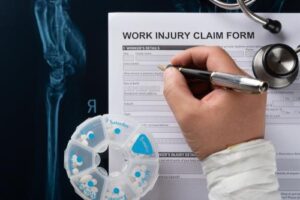
For some people injured while working at Publix, seeking recovery can feel like an uphill battle. The large grocery chain has teams of professionals protecting its interests, while injured employees struggle alone.
If you’ve been injured stocking shelves, unloading trucks, or performing other duties for Publix, an Atlanta workers’ compensation lawyer can help you. John Foy & Associates understands what you’re going through and the kinds of injuries people in your position face.
Publix’s insurers may deploy strategies to reduce or deny your claim, but John Foy’s team can fight back for you. We know workers’ comp law inside and out and will ensure you receive every benefit allowable for a Publix workers’ compensation claim.
How Do I File a Claim for a Work-Related Injury at Publix?
The first step is to notify your manager and fill out an incident report as soon as possible. This establishes notice of the accident to your employer. Publix may direct you to a workers’ comp doctor for initial treatment.
You will then need to file a “Notice of Injury” form with Publix’s insurance carrier within 30 days. A claims adjuster will be assigned to investigate and they may contact you for a recorded statement.
If your claim is initially accepted, benefits should begin without delay. However, carriers do not always make prompt decisions or payments. Having an Atlanta personal injury lawyer assist from filing to resolution can ensure all your rights are protected and entitlements received properly under Georgia law.
Get the strong arm
What Injuries Are Common for Publix Employees?
Publix workers spend long hours stocking shelves, moving items, and standing for long periods. Some positions work with sharp equipment. Here are some common injuries we’ve seen in the supermarket industry:
- Repetitive strain injuries to the back, shoulders, arms, and hands from lifting, stocking shelves, bagging items, and unloading delivery trucks.
- Slips, trips, and falls while stocking shelves, unloading heavy carts or cases, or transferring items on wet or cluttered surfaces.
- Hernias from repetitive heavy lifting or strenuous exertions without proper lifting technique or safety equipment.
- Lacerations by box cutters or broken glass while unloading goods.
- Burns from contact with hot surfaces in bakeries or deli equipment.
- Stress or mental health issues from demanding work under tight deadlines, heavy customer interactions, risk of robberies, or violence in high-crime areas.
- Respiratory issues or asthma exacerbated by regular exposure to cleaning chemicals, dust, pollen, or other allergens in grocery environments.
What Types of Settlements Are Possible From a Successful Workers’ Comp Case?
There are a few main types of workers’ compensation case settlements. For injuries requiring only temporary medical treatment and missed work time, a full-duty release settlement provides a lump sum to compensate the worker and fully close out the claim.
People with more serious injuries with possible long-term effects could pursue a partial disability settlement. This provides ongoing benefits based on an impairment rating to compensate for decreased future earning capacity from the injury.
In cases of severe injury, a settlement for total disability may be negotiated. This is usually a larger one-time payout to fully retire the claim. Both partial and total disability could be considered temporary or permanent.
What Expenses Will My Workers’ Comp Claim Cover?
If your claim is valid, the insurance carrier is responsible under Georgia law for paying all reasonable and related medical expenses regarding the injury. This includes doctor visits, surgical procedures, hospital stays, prescriptions, medical devices, and related expenses.
Lost wages are also covered through temporary total disability or temporary partial disability benefits if you miss time from work or have restrictions preventing your regular duties. This wage replacement pays a percentage of your average weekly pay.
It’s important to know the full scope of covered expenses, so you get the treatment you need without financial hardship and fully leverage your entitlement to wage benefits during recovery. An attorney can ensure the insurance carrier meets all obligations under the statute.
What if Publix Disputes That My Injury Was Work-Related?
Establishing work-relatedness, also called causal connection, is crucial for any workers’ compensation claim to be accepted and paid out. However, Publix may dispute this element to avoid or limit liability.
Common tactics include scrutinizing job duties to downplay exposure risk factors, alleging alternative causes outside work, and citing pre-existing conditions. If denied outright based on this, the worker has 60 days to appeal administratively and request a hearing.
If you’re in this situation, a lawyer’s guidance is invaluable to gather proper documentation, cross-examine corporate medical defense, and effectively advocate that the injury arose because of job-related activities.
How Else Can an Atlanta Workers’ Comp Lawyer Help Me With My Claim Against Publix?
In addition to navigating the complex legal process, an attorney can provide several other important functions to support a Publix workers’ compensation claim.
- If there are delays or improper claim handling problems, the lawyer may need to threaten or file motions and sanctions against the carrier to prompt resolution.
- A lawyer will also monitor any changes in your medical treatment or condition that could impact benefits duration or settlement prospects.
- Should disputed medical bills, unpaid checks, or other coverage and payment issues emerge, an attorney is prepared to demand compliance.
- Taking depositions of key witnesses and experts allows an attorney to flush out weaknesses or inconsistencies in an employer or carrier’s case.
Contact John Foy & Associates today. With proper legal help from an experienced workers’ compensation lawyer, an injured Publix associate can focus fully on recovery and feel assured that they will get a fair and just value for their case.
404-400-4000 or complete a Free Case Evaluation form





